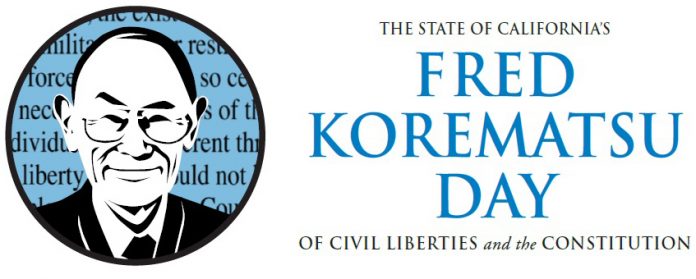For some folks, yesterday was Jan. 30, a Thursday. Another day checked off the calendar. But for others, especially in the Japanese-American community, that day chimes in the history books as the first day in the U.S. named after an Asian American, Fred Korematsu Day. He would have turned 100 yesterday.
In 1942, at the age of 23, Korematsu was the man who refused to go to the government’s incarceration camps for Japanese-Americans, a move by the U.S. Government that rounded up scores of Japanese-Americans here on the Central Coast and around the Pajaro Valley, among other places. After he was arrested and convicted of defying the government’s order, Korematsu appealed his case up through the Supreme Court, the Fred Korematsu Institute said. In 1944, the Supreme Court ruled against him, saying incarceration was justified—a military necessity.
Decades later, in 1983, Prof. Peter Irons, a legal historian, and researcher Aiko Herzig-Yoshinaga, revealed that government intelligence agencies had hidden key documents from the Supreme Court in 1944. So much for the term, Supreme. Those documents showed that Japanese Americans had committed no acts of treason to justify mass incarceration, the Fred Korematsu Institute said. Thus, Korematsu’s 40-year-old case was re-opened on the basis of government misconduct. In 1983, Korematsu’s conviction was overturned in San Francisco. That became a pivotal moment in civil rights history.
“Fred was my friend,” said Mas Hashimoto of Watsonville. “At my request, he came to speak to our teachers at the Santa Cruz County Office of Education before his passing. Recently, the decision of incarcerating anyone under “military necessity” without charges, attorney, witnesses, trial or due process of law was overturned but replaced by Trump’s Muslim Travel Ban. The fight for justice continues.”
It’s worth noting that Korematsu continued being an activist throughout his life, and in 1998 he received the Presidential Medal of Freedom from President Bill Clinton, the nation’s highest civilian honor. In 2010, California passed the Fred Korematsu Day Bill.
In recent years we have seen the images of the man in Tiananmen Square who stood up to the file of angry military tanks alone. That was June 5, 1989, the morning after the Chinese military had suppressed the Tiananmen Square protests by force. There’s a mighty list of these warriors. Rosa Parks, the civil rights activist who would not surrender her seat to a white passenger on a segregated bus in Montgomery, Alabama, in 1955. She was arrested. Her determination launched a nationwide effort to end racial segregation of public facilities.
Among other things, we now have the Korematsu Institute based in San Francisco. Fred Korematsu’s once said, “Stand up for what is right.”
Contact reporter/photographer Tarmo Hannula at th******@********an.com.












